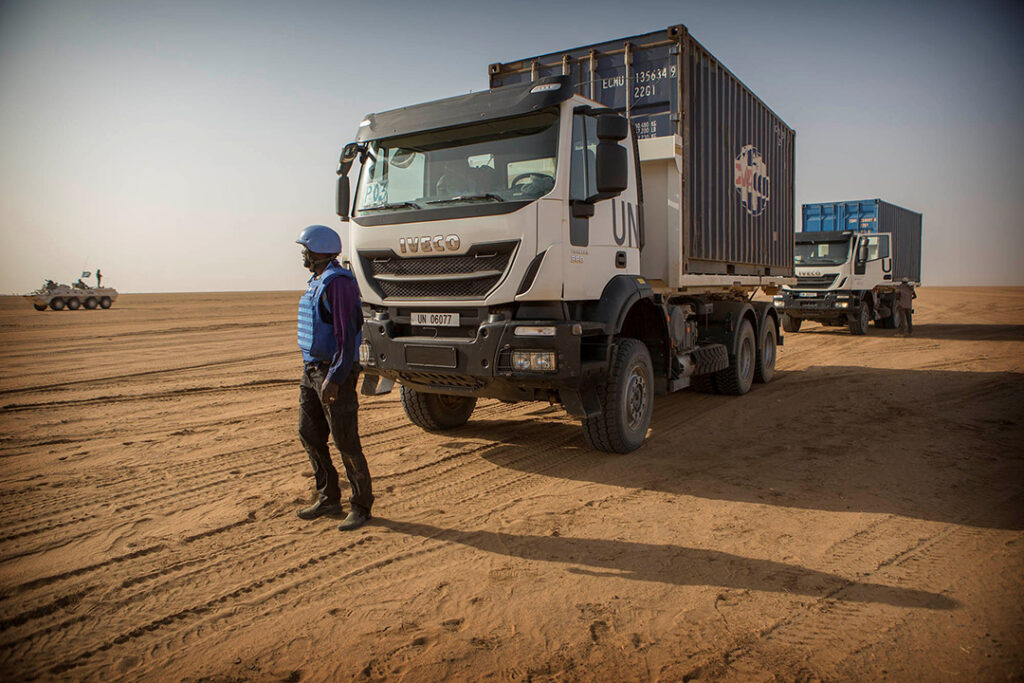ADF STAFF
Hostility from Mali’s ruling junta toward the United Nations is making it more difficult for the country’s peacekeeping mission to fulfill its mandate.
Mali’s military leaders expelled the spokesman for the United Nations’ peacekeeping mission in Mali (MINUSMA) for comments he made on Twitter about the arrest of 49 Ivorian Soldiers in the country on July 10.
Spokesman Olivier Salgado’s Twitter post stated that the Malian government knew about the arrival of the 49 Soldiers from Côte d’Ivoire ahead of time. He said they were part of a logistics support team, and their deployment is a common practice to support national contingents in a U.N. mission.
The government has charged the Soldiers with being mercenaries sent to overthrow the junta. They are being held for prosecution. Mali officials called Salgado’s post “tendentious and unacceptable.”
The U.N. extended MINUSMA’s peacekeeping mandate for another 12 months at the end of June.
At the time, Mali’s ambassador to the U.N. Issa Konfourou said his government could not guarantee peacekeepers’ free movement as they travel the country investigating human rights violations. Mali would not allow the renewed mission to fulfill its mandate, Konfourou said.
MINUSMA has operated in Mali since 2013 when it was created to help the then-government deal with an extremist uprising in the north of the country.
MINUSMA is one of the U.N.’s largest peacekeeping missions, with more than 17,600 members operating in Mali as of April. It is also one of the deadliest missions. Since launching in 2013, MINUSMA has reported 275 deaths, more than half of them from hostile activity.
On July 14, four days after the arrest of the Ivorian soldiers, the junta announced it was forbidding the rotation of fresh MINUSMA troops. Egypt announced the next day it would pull its forces out of MINUSMA on August 15.
“The rotation of the mission’s contingents is of crucial importance for its operational effectiveness and the morale of its uniformed personnel,” Salgado said at the time. “Everything must be done for its urgent settlement, especially since some of the staff concerned should have been relieved several months ago.”
Egyptian officials said the pullout was temporary and done in response to attacks that killed seven of their soldiers who were escorting MINUSMA convoys around the country. Two Egyptian troops died in an attack on July 5 in Gao. A dozen MINUSMA peacekeepers have died in Mali since January, according MINUSMA’s latest report.
The same report, issued on July 1, counted 213 attacks with improvised explosive devices — up 43% from the previous 12 months.
MINUSMA has drawn the junta’s ire for its investigations of human rights violations, which have increased sharply since the arrival last December of mercenaries with Russia’s Wagner Group.
MINUSMA reported 684 human rights violations in the first half of this year, including 155 summary executions and 58 disappearances. More than 7.5 million people need humanitarian assistance in the country, up 25% in a year, the report said.
The most dramatic case of human rights violations this year occurred in the central Mali community of Moura. A mix of Malian troops and Wagner mercenaries encircled the community on March 27 and spent the next four days executing 300 men.
Human Rights Watch described the massacre as “the worst single atrocity reported in Mali’s decade-long armed conflict.”
Konfourou said it is Mali’s duty to investigate human rights violations on its territory.
France’s ambassador to the U.N., Nicolas de Riviere, said Mali must allow MINUSMA to perform its duties of peacekeeping and monitoring human rights violations.
“The perpetrators of violations must be brought to justice,” de Riviere said.

